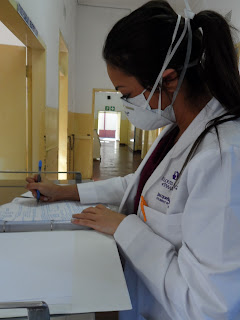In the afternoon, we visited the
ICU to check in on our diabetic ketoacidosis patient. When we arrived they brought in a head trauma
patient who had been hit by a car on foot.
This is very common as most Swazi people get around the town by
walking. We were able to see the patient
being brought in and mechanically ventilated.
This was a new experience for both of us. After the patient was stabilized and
adequately sedated, we discussed the status of the patient with Dr.
Kinsala. We went through the medications
used for this patient. This included
midazolam for sedation, morphine for pain, and dexamethasone for the brain hemorrhage. The patient’s PaO2 was less than
60 mmHg at 40 mmHg which helped us determine that the patient was hypoxemic. We followed up on our DKA patient who had
unfortunately not shown any signs of improvement but was stable. Just like most days here, many family members
were waiting outside all day to see their loved ones.
We have also had the opportunity
to visit the Central Medical Stores.
This is similar to a warehouse you might see in the US; however they provide
medications to all public health facilities throughout Swaziland. We met with the pharmacist, Brenda, who explained
to us their role in Swaziland health care and discussed some of her
concerns. A major problem they are faced
with is quality assurance for the medications.
Swaziland does not have any drug manufacturers within their country, and
have to order drugs from other countries such as South Africa and India. She allowed us to look at some drugs they received
that were not up to standard. Some of
these included a liquid suspension that was solidified upon arrival, questionable
drug ingredients in IV solutions, and inappropriate packaging. Central Medical Stores does not have the equipment
necessary to test the ingredients of the drugs, and is worried that some of the
drugs they are sending to pharmacies are counterfeit and may be harmful to
patients. One step they are taking to
improve their quality assurance is having manufactures send drug samples prior
to purchasing large orders of the drug.
Dr. Schafermeyer spoke with Dynalabs last year, who were interested in partnering with Brenda to send drug
testing equipment to Central Medical Stores in Swaziland. We are going to follow up with Dynalabs to
see if this offer still stands, as Brenda expressed great interest in having
proper quality assurance equipment. She
gave us a tour of the warehouse, and explained delivery, storage, and procedure. We will be keeping in contact with Brenda, as
she plans to provide us with a list of medications she finds to be most
troublesome and counterfeited.
We've been having a fantastic time so far and have already learned so much. The Swazi people have been very welcoming to us and we have made many friends along the way.
The weather has been beautiful and we have enjoyed driving through the mountains (despite the terror of driving on the opposite side of the road).
The weather has been beautiful and we have enjoyed driving through the mountains (despite the terror of driving on the opposite side of the road).
One of the local pharmacists named
Willie graciously invited into his home to meet his family and enjoy some
traditional African food. They were so
kind and very open to answering any questions about pharmacy in Swaziland and
were also very interested in pharmacy in the US. We had great conversation over similarities
and differences in not only pharmacy, but the culture as well.













No comments:
Post a Comment